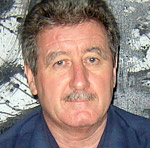British engineer Bruce Tasker continues his assertions that the $30 million credit provided by the World Bank and $5 million subsidy provided by the government of Armenia for the project of Yerevan water supplying system development has been used improperly and with violations.
In 2003-2004 the latter worked in the commission of the National Assembly on supervising the efficiency of using foreign grants, human aids and credits and has deeply investigated the entire project of Yerevan water supply system development. In March, 2004, the head of the commission, NA vice speaker Vahan Hovhannisyan promised that he would discover all the violations and facts to the public after finishing the works; however he has not done that so far. This year Mr. Tasker has applied to GAP, the Human rights and free speech organization of Washington, and submitted documents to support his assertions. GAP and Tasker have jointly submitted a demand letter to INT (Department of Institutional Integrity) to investigate the facts of violations. However, two days ago the WB made a statement that “the preliminary investigation of the additional documents supplied has not so far discovered any substantial facts proving his (Tasker’s) assertions or violations or corruption within the projects financed by the World Bank”. Tasker has decided to publish several more facts concerning violations in the project for developing Yerevan water supply system. With this action Tasker wants to inform what kind of financial machinations have been done in the mentioned credit project and prove that he has substantial facts to support his allegations.
Tasker says that according to the RA Government’s Decision 1032, “Alcon”, a domestic audit firm has re-evaluated the real property and facilities of “Yerevan Water Company” (YWC), which totaled at one million dollar. At the same time as well as the YWC submitted a report, where it had re-evaluated the company’s real property and facilities. Tasker showed that report, where YWC initially evaluated its real property and machinery at 0,5 million dollar, and later at 100 million, which is more by 200 times than the initial evaluation. After that report they made one more evaluation, during which they deducted certain expenses, included the wear and tear amounts, as a result of which the evaluation amount was decreased and amounted at $25 million. Besides that, YWC alleges that it has lost amortization amounts totaling at 6 million dram. To note, such financial accounting has been done every year in this company, which was initially controlled by KPMG independent audit company, and later by the WB. The water economy state committee and municipal development project were informed about it. This means that the domestic organizations and the mentioned and other foreign institutions were informed about those evaluation changes. Tasker says it is very surprising that it did not seem strange to anyone how could the value of the Company’s personal assets grow rapidly from a half million and become 100 million, and later in a short period become 25 million. The British engineer believes this rapid change was a result of great violations or financial machinations.
The problem is that the real property and personal assets of YWC had to be put in pledge against the WB credit. It was the condition of the WB. However, it may not seem fair to pledge property, which is more expensive by twenty times than the credit to be taken against such pledge. The fact is that the Armenian party initially agreed upon the mentioned condition, however later they decided to pledge the personal assets only. In Tasker’s words, it is the reason why YWC evaluated its machinery and equipments so expensive. According to him, the real price of the personal assets was the same as initially evaluated by “Alcon”, which was one million dollar. As for the machinery, they were old and partly out of order, which the company had inherited from the Soviet times. Accordingly, the 30 million credit from the WB was taken against such pledge, which value was artificially increased to 100 million and later decreased to 25 million as a result of financial machinations. However, in all reports it was written that the pledge contained both the real property and personal assets. At first glance it seems that our authorities have cheated the World Bank. However, it would be a very simple opinion since this institution supports more expensive water system development projects in bigger countries. Besides that, hardly it is possible that the WB did not know that only the personal assets had been pledged against the credit. Definitely everything was agreed and done through violations. As for the real property, which has not been pledged, it can be easily privatized by the authorities. This is the real hidden danger.
Tasker says that this is one of the facts that he has submitted to GAP. GAP accepted that document, studied it and applied to INT on March 29 of this year. It is an institution, which is in charge of investigating violations within the bank. However, it is hard to say whether this institution will be impartial to the investigation of violations on the part of an office, which is a part of their common organization. On the other hand, it may be possible that INT is an institution, which protects the WB.
On October 15 GAP applied to INT asking what type of documents and proofs it needed to precede the claims concerning the violations in the water supply system development project. INT has not asked for any documents to prove the allegations from Tasker or GAP. This week the WB and International Monetary Fund are holding their annual summits in Washington. RA prime minister Serzh Sargsyan is participating in this summit too. It is expected that today there will be reports concerning violations of water supply projects supported by the WB in different countries. GAP is going to present the documents it has concerning the water project of Yerevan at this meeting.

